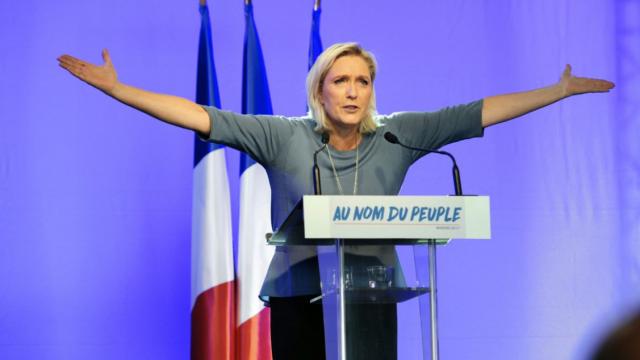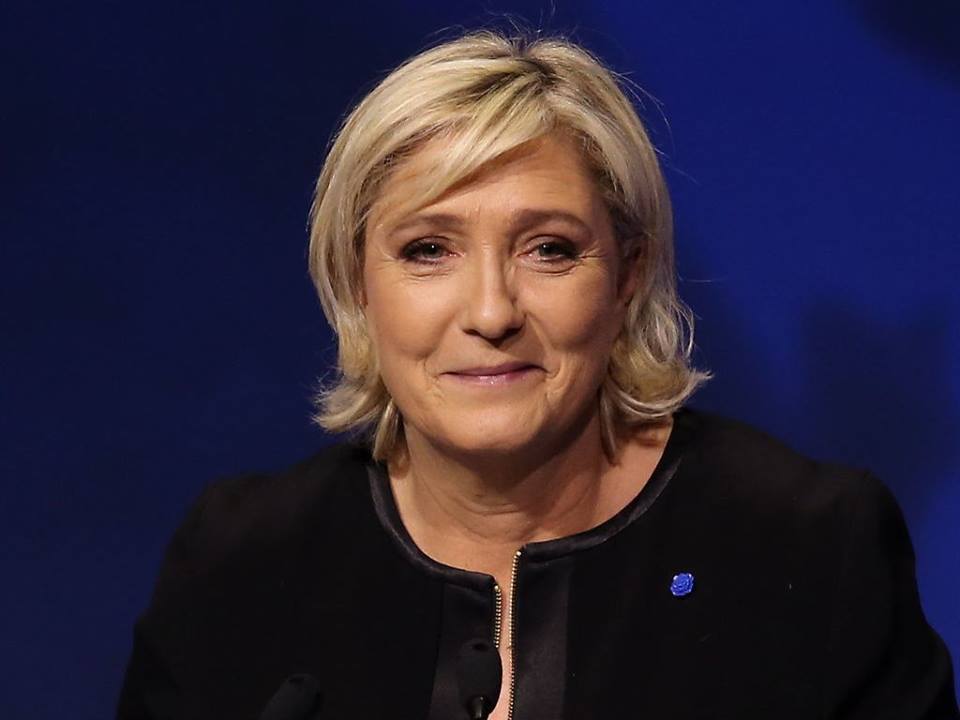
An anti-immigrant firebrand and an unconventional centrist were set Sunday to advance to a runoff in a tight race for France’s president, according to exit polls released immediately after balloting closed. If confirmed, the results set up a sharp confrontation between those who embrace globalization and those who want to roll it back.
Centrist Emmanuel Macron placed first and far-right leader Marine Le Pen placed second in initial exit polls in the first round of France’s presidential election, advancing them to a head-to-head showdown in the runoff on May 7. It was poised to be a historic wipeout for the two political parties that have traded power in post-World War II France, with neither the Socialists nor the center-right descendants of Charles de Gaulle having a shot at the presidency.
The victor could determine whether the international alliances that formed the backbone of the post-World War II West strengthen or are shattered by the force of nationalism.
Le Pen has said she will seek to pull France out of the European Union, a move many European leaders think would doom the 28-nation bloc, and she would rekindle relations with Russian President Vladimir Putin after years of strife between Russia and the West. Macron has called for a more muscular European Union where Europe’s richest nations would do more to prop up their poorer neighbors.
If Le Pen wins, she will continue a global string of ballot-box revolutions that began last year with the British decision to leave the European Union and continued with the election of Donald Trump as U.S. president. With her fierce anti-immigration agenda and her vow to keep France for the French, she could be a Gallic counterpart to Trump. But if Macron is triumphant – and polls suggest he will be, by a margin of 30 percentage points – it could halt the transatlantic disruptions, at least for now.
In a year of populist drama, the closely watched election offered citizens sharply differing choices about France’s role in the world. The front-runners ranged from an ex-Trotskyist campaigner who wants to impose a maximum income to Le Pen, a hard-edged, anti-immigrant leader who wants to split from the European Union and reorient toward Russia.
Nearly a third of French voters were undecided in the days leading up to the election, a measure of the degree to which the political system has been scrambled after years of high unemployment and disenchantment with the Socialist and conservative parties that have traded power for generations.
Final turnout was estimated to be 77 percent, 3 percentage points lower than the 2012 election, but higher than expected. Before the vote, there were worries that many citizens would stay home because they were disappointed by their choices. In a measure of the security concerns surrounding the vote, a polling station in the eastern town of Besancon was briefly evacuated when a car ran into it, but it was quickly deemed to be unrelated to terrorism.
“I’m not really enthusiastic about any of the candidates,” said Sophie Girardeaus, 30, who works in a youth center and voted Sunday for far-left candidate Jean-Luc Mélenchon. “But it mainly was a vote against all the other contenders. A lot of my friends were also still undecided yesterday,” she said outside a Paris polling station near the Bataclan nightclub, the site of a terrorist attack in November 2015.
The election has special resonance after last year’s vote by Britain to leave the European Union and Donald Trump’s victory in the U.S. presidential campaign. If Le Pen, 48, seizes France’s presidency, it will be another advance for nationalistic forces that question the value of international alliances and seek to turn back the forces of globalism. She has electrified rallies with her vows to roll back the clock in France, a vision that largely excludes its Muslim population, estimated to be Europe’s largest. And if she succeeds in her quest to pull France from the European Union, the rest of the bloc could quickly fall apart.
But if the centrist, pro-E. U. Macron, 39, ascends to the gilded halls of the Elysee Palace, the home of the French presidency, the 28-nation bloc could be reinvigorated by his vows to make rich countries do more to help the weakest ones. Macron, who was economy minister until August, has never held elected office and has struggled to create as energetic or committed a base as Le Pen’s, even as he has led in many opinion polls.
“I’m hoping for the renewal of the French political scene,” said Catherine Grevelink, 56, who oversees legal issues at a bank and voted for Macron in the leafy Saint-Cloud suburb of Paris, which typically elects right-wing candidates. “He’s very intelligent. Now we have to see how this comes out as he governs, if he is president,” said Grevelink, who turned against the center-right François Fillon after a corruption scandal emerged in January.
Anger has been the overwhelming sentiment at rallies across the country in recent weeks. More than ever, 2017 has presented real alternatives for voters eager to make drastic changes to French and European politics.
Whatever the outcome of the race, it will mark a turning point in the history of modern France.
Both of the traditional parties that have governed France since 1958 — the center-left Socialists and center-right Républicains — have struggled to make inroads with voters. François Fillon, the center-right candidate, has been fending off corruption allegations after a public spending scandal. Benoît Hamon, the Socialist candidate, has nearly no chance of advancing to the second round and trails Mélenchon, who would seek to immediately withdraw France from NATO’s unified command.
The election has seen the rapid demise of the Socialist Party, a bedrock of French and European politics for decades. France’s current Socialist president, François Hollande, is deeply unpopular, with a term that has been dogged by stagnant double-digit unemployment figures and a painful drumbeat of terrorist attacks. But the party’s downfall, analysts say, ultimately stems from bitter internal divisions that mirror those in the Democratic Party in the United States.
That polarity is on full display in the current campaign, with two former Socialists — Macron and Mélenchon, a longtime left-winger — forging their own vastly different political movements. Macron, a former investment banker, is friendly to neoliberal, pro-business agendas; Mélenchon, a former Trotskyist, would nationalize France’s biggest banks.
The shift also reflects the “sociological transformation of French society” in recent years, said Gérard Grunberg, a historian of French socialism at Sciences Po in Paris.
“In ways few predicted, the popular classes became more anti-immigrant than anti-capitalist,” Grunberg said. “That’s a fact of social democracy all across Europe, and especially so in France.”
The vote came after a turbulent campaign in which longtime pillars of France’s political establishment were rejected by voters or discredited by scandal. Hollande, the most unpopular of all postwar French presidents, said he would not seek reelection. His most prominent Socialist successor lost to a primary challenger. So did the center-right former president, Nicolas Sarkozy.
Thursday’s attack on police officers patrolling Paris’s glittering Champs-Elysees boulevard was the final, bloody exclamation point in a campaign that often revolved around fears of terrorism and immigrants. One officer died and two were wounded by a gunman who pledged loyalty to the Islamic State militant group.
Filled with fresh worries about security, voters may be drawn toward Le Pen’s growling message toward refugees and terrorism suspects.
“I really fear that Le Pen might win,” said Chibane Nadir, 47, an Algerian French resident of Saint-Denis, a heavily immigrant area north of Paris. “If Le Pen wins, she will divide the country, Europe and probably the world. She is a racist and full of hatred.”
Another beneficiary may be the campaign’s early front-runner. Fillon, 63, is a right-wing challenger who seeks a Margaret Thatcher-style overhaul of France’s economy. In January, he was knocked off his top-tier perch after a nepotism scandal, but he staged a late comeback and reestablished himself as a credible contender to advance to the second round of voting.
Fillon was France’s prime minister from 2007 until 2012 and has an aggressive plan for combating terrorism that critics say edges toward Le Pen’s in its harsh attitudes toward Muslims and civil liberties.
Some voters said Sunday that they favored Fillon precisely for that reason.
“The most important issue of this campaign was terrorism, and something needs to be done about it,” said Christine Perchaud, 52, an administrative secretary in Saint-Denis who voted for Fillon.
The fourth front-runner is Mélenchon, 65, a far-left campaigner who has electrified audiences with his soak-the-rich rhetoric and has vowed to upend France’s political system by pulling the nation from the European Union, which he criticizes as captured by finance and big business. Although he is the oldest front-runner, his Web-savvy campaign has captured youth interest through speeches released on YouTube, rallies at which he has appeared by hologram and a video game in which players play a Robin Hood-type figure attacking the rich to bring money into public coffers.
If Mélenchon and Le Pen advance to the final round — a realistic possibility, given the overall uncertainty and each candidate’s fired-up base — there would be immediate reaction across the globe, since both candidates want to ditch the euro currency and leave the European Union. They would also leave NATO’s unified command structure and reorient France’s foreign policy to be more favorable toward Russia.
Even the mere possibility of France leaving the euro probably would create a run on French banks and lead to sharply higher borrowing costs for the country, a replay of Greece’s difficulties on a far larger stage. The Russian government, meanwhile, could be emboldened knowing that it is guaranteed a French leader who seeks distinctly warmer ties. Fillon is also friendly with Russian President Vladimir Putin and has questioned France’s support for sanctions against Russia.
Though Le Pen has been in first or second place in first-round opinion polling throughout most of the campaign, most polls show she will fall to any second-round challenger.
3 WAYS TO SHOW YOUR SUPPORT
- Log in to post comments

















